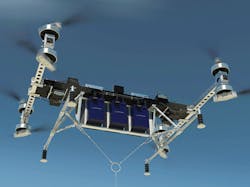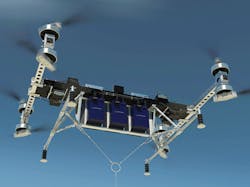Navy sponsors experiment to demonstrate UAV technology to deliver cargo to ships at sea
PATUXENT RIVER NAS, Md. — U.S. Navy unmanned aerial vehicle (UAV) experts are inviting industry to participate in experiments in March to demonstrate ways of using UAVs to deliver cargo to and from ships at sea.
Officials of the Naval Air Warfare Center Aircraft Division at Patuxent River Naval Air Station, Md., will sponsor a limited-objective experiment the week of 25 March 2019 Patuxent River NAS to assess the state of cargo UAV technologies.
Navy leaders want the ability to deliver cargo autonomously with UAVs between shore-to-ship, ship-to-ship, and ship-to-shore. The March experiment will demonstrate the ability to transport a 50-pound payload with a UAV.
The U.S. Navy is asking for technology demonstrations this spring of future unmanned aerial vehicles (UAVs) that can deliver cargo to and from surface ships at sea.
The UAV will launch from a fixed shore base, navigate through two waypoints to a towed barge in open water making bare steerageway at 3-5 knots located at least 25 nautical miles away. The UAV must loiter for 10 minutes, then autonomously land aboard the barge.
After that, the UAV will launch from the barge with the same 50-pound payload and return to the initial shore-based launch site, without refueling or recharging on the barge. Back on shore, participants must demonstrate refueling or recharging.
En-route, the UAV may have GPS navigation, but Navy researchers prefer navigation that does not rely on GPS satellite navigation, and that has a low probability of intercept. No cargo UAVs will be allowed that are longer than 13 feet.
The UAV must fly at speeds of at least 40 knots at altitudes no higher than 2,000 feet. It must launch and recover with a catapult, arresting net, cable, or other mechanical equipment. The UAV must have a transponder with at least Mode-3/C capability. Successful participants may be awarded procurement contracts for more experiments.
Companies interested may apply to participate online at http://impax.tech/cargo-uas-experiment. For technical questions or concerns contact Bill Macchione by email at [email protected], or by phone at 301-247-4008.
More information is online at https://www.fbo.gov/spg/DON/NAVAIR/N00421/NAWCAD-SN-19-008/listing.html.

